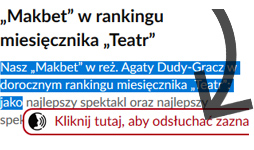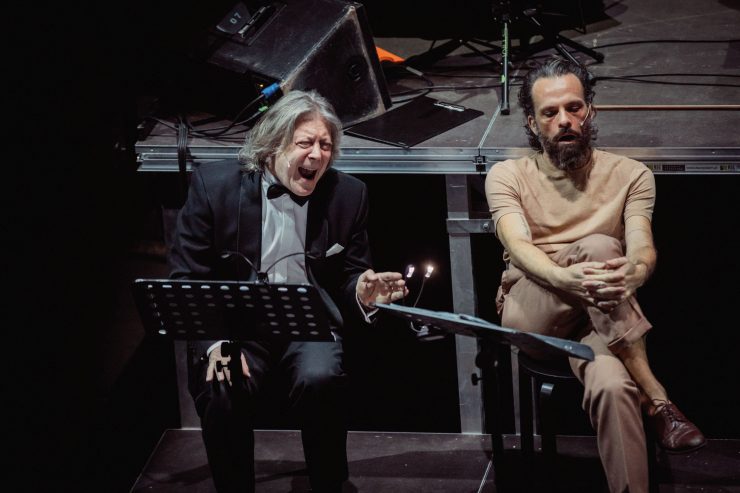date: March 27, 2022, 18:00
duration: 90 minutes
tickets: 70, 60, 50 PLN
Text: Elfriede Jelinek, direction, set design, costumes: Katarzyna Kalwat, music: Wojtek Blecharz, translation, libretto, dramaturgy: Monika Muskała, musical direction: Andrzej Bauer, lighting design: Paulina Góral, artistic supervision: Andrzej Bauer, Wojtek Blecharz, Katarzyna Kalwat, vocal preparation: Aldona Krasucka, choreography: Karolina Kraczkowska, set designer’s assistant: Anna Rogóż
Cast: Adam Woronowicz, Magdalena Kuta, Lech Łotocki, Tomasz Tyndyk, Paweł Smagała, Justyna Wasilewska, Andrzej Bauer, Magdalena Bojanowicz, Mateusz Błaszczak, Marcin Zdunik
Producer: Renata Majewska
The performance is not a reconstruction of events that happened 70 years ago in Rechnitz. Instead, it is an attempt to understand the mechanisms of collective memory. It is also a story about recent European history and European identity, with the experience of war and the Holocaust as a part of it.
Rechnitz is a small, rich town on the Austro-Hungarian border. There was a palace here, but it burned down shortly after the war. On the night of March 23/24, 1945 – a few months before the fire, started by Soviet soldiers, or maybe by someone from the village – at a ball at Countess Margit von Batthyány née Thyssen-Bornemisza, the most influential people in the area had fun: the commanders of the Gestapo and the SS, head of the Nazi Party, civilian officials. Then, around midnight, the bellwether invited them to kill. The grave of one hundred and eighty Hungarian Jews, labourers in the countess’s estate, previously locked in the palace barn, has never been found.
The story of the bloody ball was written by Elfriede Jelinek to the voices of five Messengers, presenting their own versions of events, in line with the play’s prologue:
This is how the world ends. Here’s how the world ends. Here’s how the world ends. Not with a bang, but a whimper. History always tunes its instruments but rarely plays them. But today is the day it will play with us. We are its instruments. We’re in tune now. We tune in with history. So our testimonies should sound and should correspond with each other.
Wojtek Blecharz, opera composer: – The actor becomes a musician, singer, beatboxer, his way of presenting the text is coupled with a set of four cellos that follow the narrative, accompany, but also have their own role to play, because they symbolize what is left of the palace orchestra from its former glory, forced to entertain the degenerate aristocracy and the Nazis.
Katarzyna Kalwat, director of the show: – Jelinek’s text shows how language participates in covering up, distorting and blurring guilt. It defends itself against the truth and smoothly deals with talking about moral excesses, crimes, genocide.
A cross was erected at the crime scene in Rechnitz, but it did not survive. So now, an inconspicuous obelisk stands by the ruins of the barn. The perpetrators of the massacre, thanks to the money of the Batthyány family, settled in distant countries, and the countess herself lived a fairy-tale life of a racehorse breeder in Switzerland. She died in 1989. There’s her photo with Queen Elizabeth II, among the things she left. The countess receives an award but doesn’t smile.
Photo Marcin Oliva Soto






